PEP小学英语六年级上册知识点总结( 自己整理)
最新人教版PEP英语六年级上册知识点归纳
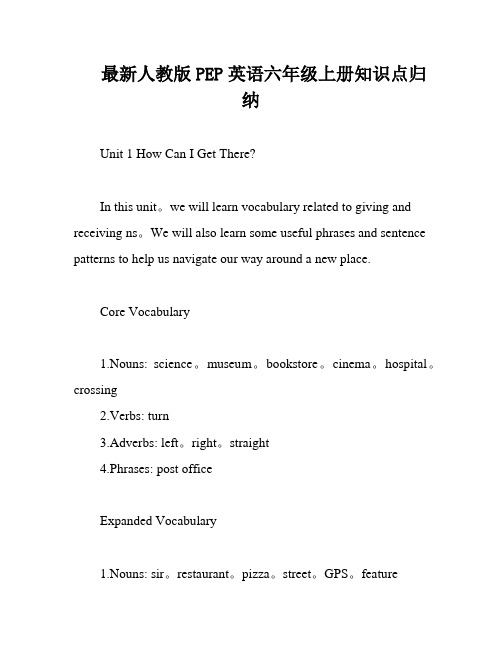
最新人教版PEP英语六年级上册知识点归纳Unit 1 How Can I Get There?In this unit。
we will learn vocabulary related to giving and receiving ns。
We will also learn some useful phrases and sentence patterns to help us navigate our way around a new place.Core Vocabulary1.Nouns: science。
museum。
bookstore。
cinema。
hospital。
crossing2.Verbs: turn3.Adverbs: left。
right。
straight4.Phrases: post officeExpanded Vocabulary1.Nouns: sir。
restaurant。
pizza。
street。
GPS。
feature2.Verbs: ask。
get。
gave。
follow。
tell3.Adjectives: interesting。
Italian。
farSentence Patterns1."Where is the ____?" - "It's next to the ____."2."How can we get there?"3."Turn left/right at the _____。
Then turn left/right at the _____."Note: Be mindful of ns and their fixed phrases.Useful Phrases1."Is there a ____?"2."There is a ____ under the ____."3."There be" sentence pattern - "There is/are ____." (Remember the principle of proximity.)By learning and practicing these vocabulary words。
小学六年级上册英语知识点归纳总结
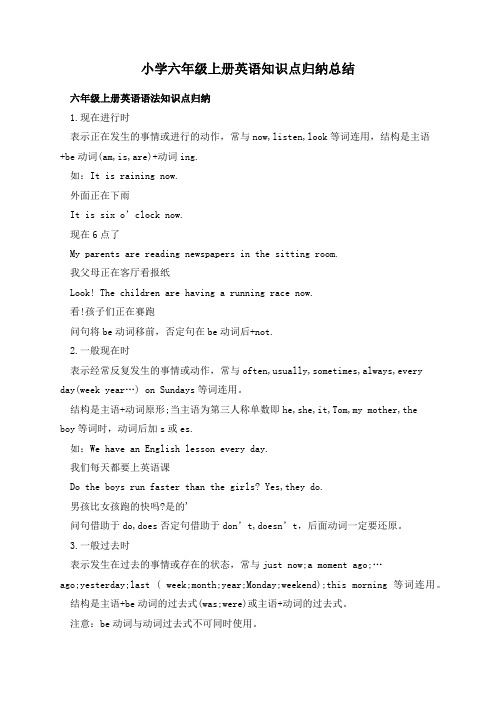
小学六年级上册英语知识点归纳总结六年级上册英语语法知识点归纳1.现在进行时表示正在发生的事情或进行的动作,常与now,listen,look等词连用,结构是主语+be动词(am,is,are)+动词ing.如:It is raining now.外面正在下雨It is six o’clock now.现在6点了My parents are reading newspapers in the sitting room.我父母正在客厅看报纸Look! The children are having a running race now.看!孩子们正在赛跑问句将be动词移前,否定句在be动词后+not.2.一般现在时表示经常反复发生的事情或动作,常与often,usually,sometimes,always,every day(week year…) on Sundays等词连用。
结构是主语+动词原形;当主语为第三人称单数即he,she,it,Tom,my mother,theboy等词时,动词后加s或es.如:We have an English lesson every day.我们每天都要上英语课Do the boys run faster than the girls? Yes,they do.男孩比女孩跑的快吗?是的'问句借助于do,does否定句借助于don’t,doesn’t,后面动词一定要还原。
3.一般过去时表示发生在过去的事情或存在的状态,常与just now;a moment ago;…ago;yesterday;last ( week;month;year;Monday;weekend);this morning等词连用。
结构是主语+be动词的过去式(was;were)或主语+动词的过去式。
注意:be动词与动词过去式不可同时使用。
如:My earphones were on the ground just now.我的耳机刚刚还在呢。
小学英语PEP六年级上册4-6单元知识点总结
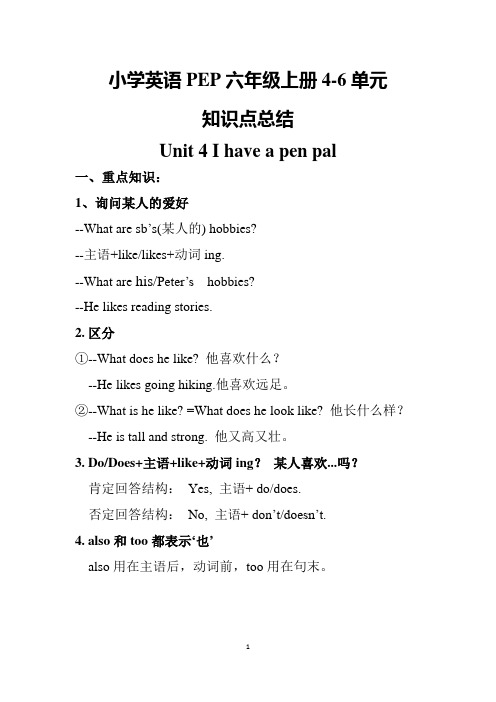
小学英语PEP六年级上册4-6单元知识点总结Unit 4 I have a pen pal一、重点知识:1、询问某人的爱好--What are sb’s(某人的) hobbies?--主语+like/likes+动词ing.--What are his/Peter’s hobbies?--He likes reading stories.2.区分①--What does he like? 他喜欢什么?--He likes going hiking.他喜欢远足。
②--What is he like? =What does he look like? 他长什么样?--He is tall and strong. 他又高又壮。
3.Do/Does+主语+like+动词ing?某人喜欢...吗?肯定回答结构:Yes, 主语+ do/does.否定回答结构:No, 主语+ don’t/doesn’t.4.also和too都表示‘也’also用在主语后,动词前,too用在句末。
5.宾语6.区别What is his hobby?(单数)What are his hobbies?(复数)7.be interested in对...感兴趣二、动词变三单:1、一般情况是在动词后加-s如:read - reads,write - writes,say – says2、以s,x,ch,sh,结尾的词加-es如:teach - teaches,wash - washes,3、①以辅音字母+y结尾的词变y为i再加-es如:try - tries②元音直接+s如:play -plays4、不规则变化如:have- has go-goes do-does三、动词ing变化规则:1、一般情况下,直接在动词后加-ing如:study ----- studying2、以不发音的e结尾,要去e加ing如:take - taking make -- making dance ---- dancing3、双写词尾字母,再加-ing如:run ----- runningswim----swimmingshop-shopping四、如何把肯定句变成一般疑问句1.如果有be动词和情态动词,直接把他们放在句首,I,we变成you2.句中没有be动词和情态动词,则根据主语借助do/does,后面的动词用原形(I,we变成you,主语是三单才用does 其他用do)补充:be动词包括am,is,are;情态动词:can,must,will,should五.如何变否定句1.句中有be动词或情态动词直接在其后加not2.句中无be动词或情态动词,根据主语用don’t或doesn’t 放在主语后,且后面的动词用原形。
小学英语六年级上册1-6单元知识点总结
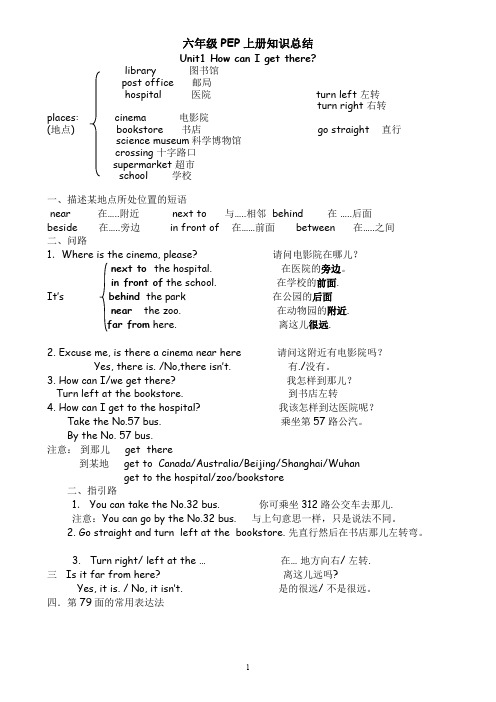
六年级PEP上册知识总结Unit1How can I get there?library图书馆post office邮局hospital医院turn left左转turn right右转places:cinema电影院(地点)bookstore书店go straight直行science museum科学博物馆crossing十字路口supermarket超市school学校一、描述某地点所处位置的短语near在…..附近next to与…..相邻behind在…..后面beside在…..旁边in front of在……前面between在…..之间二、问路1.Where is the cinema,please?请问电影院在哪儿?next to the hospital.在医院的旁边。
in front of the school.在学校的前面.It’s behind the park在公园的后面near the zoo.在动物园的附近.far from here.离这儿很远.2.Excuse me,is there a cinema near here请问这附近有电影院吗?Yes,there is./No,there isn’t.有./没有。
3.How can I/we get there?我怎样到那儿?Turn left at the bookstore.到书店左转4.How can I get to the hospital?我该怎样到达医院呢?Take the No.57bus.乘坐第57路公汽。
By the No.57bus.注意:到那儿get there到某地get to Canada/Australia/Beijing/Shanghai/Wuhanget to the hospital/zoo/bookstore二、指引路1.You can take the No.32bus.你可乘坐312路公交车去那儿.注意:You can go by the No.32bus.与上句意思一样,只是说法不同。
人教PEP版小学英语六年级上册Unit 1 单元知识小结(图表式)

Unit 1 How can I get there?PEP小学英语六年级上册重点单词和句型练习一、重点单词Unit 1:by ( ) foot( ) bike( ) bus( ) train( ) how( )go to school() traffic()traffic light()traffic rule()stop()wait() get to()Unit 2library( ) post office( ) hospital( ) cinema( ) turn( ) bookstore( ) where( ) please( )next to( ) right ( ) left( ) straight( )then ( )Unit 3next week( ) this morning( ) this afternoon( )this evening ( ) comic book( ) post card( )newspaper( ) buy( )Unit 4hobby( ) ride a bike--riding a bike( ) dive--diving( )play the violin—playing the violin( ) make kites—making kites( ) collect stamps—collecting stamps( ) live –lives( ) teach--teaches( ) go--goes( ) watch--watches( ) read--reads( ) does doesn’t=does notUnit 5singer( ) writer( ) actor( ) actress( ) artist( ) TV reporter( ) engineer( ) accountant( ) policeman( ) salesperson( ) cleaner( ) where() work()Unit 6rain( ) cloud ( ) sun( ) stream( ) come from( ) seed( ) soil( ) sprout ( ) plant( )should ( ) then( )Unit 1: ▁▁(经,乘) ▁▁(脚) ▁▁(自行车) ▁▁(公共汽车) ▁▁(火车)▁▁(怎样) ▁▁▁▁(上学)▁▁▁▁(交通)▁▁▁▁▁▁(交通灯)▁▁▁▁▁▁(交通规则)▁▁(停,停车站)▁▁(等待)▁▁▁▁(到达)Unit 2 ▁▁▁▁(图书馆) ▁▁▁▁(邮局) ▁▁▁▁(医院) ▁▁▁▁(电影院)▁▁(转弯) ▁▁▁▁(书店) ▁▁▁(在哪里,到哪里) ▁▁▁(请)▁▁▁(与…相邻) ▁▁▁ (右边) ▁▁(左边) ▁▁▁(成直线地) ▁▁▁ (然后)Unit 3 ▁▁▁▁▁(下周) ▁▁▁▁▁(今天上午) ▁▁▁▁▁(今天下午)▁▁▁▁ (今天晚上) ▁▁▁▁(漫画书) ▁▁▁▁(明信片) ▁▁▁▁ (报纸) ▁▁▁(购买)Unit 4▁▁▁(爱好) ▁▁▁▁▁--▁▁▁▁▁▁(骑自行车) ▁▁▁--▁▁▁(跳水) ▁▁▁▁▁▁—▁▁▁▁▁▁▁(拉小提琴) ▁▁▁▁▁—▁▁▁▁▁▁▁(制作风筝) ▁▁▁▁▁▁—▁▁▁▁▁▁(集邮) ▁▁▁–▁▁▁(居住)▁▁▁▁--▁▁▁▁(教) ▁▁--▁▁▁(去) ▁▁▁--▁▁▁(看)▁▁--▁▁▁(读,看) does doesn’t=▁▁▁▁Unit 5▁▁▁▁(歌唱家,歌手) ▁▁▁▁(作家) ▁▁▁▁(男演员) ▁▁▁▁(女演员) ▁▁▁▁(画家) ▁▁▁▁(电视台记者) ▁▁▁▁(工程师) ▁▁▁(会计) ▁▁▁▁(男警察) ▁▁▁▁▁▁(销售员) ▁▁▁(工作)▁▁▁▁(清洁工) ▁▁▁▁(在哪里,到哪里)Unit 6▁▁▁(雨) ▁▁▁ (云) ▁▁▁(太阳) ▁▁▁▁(河,溪) ▁▁▁▁(来自,从…来) ▁▁▁(种子) ▁▁▁(土壤) ▁▁▁ (苗,芽) ▁▁▁(植物,种植) ▁▁▁(应该) ▁▁▁▁(然后)二、单词分类1)交通方式:by bus, by train, by subway, by ship, by plane, by car, on foot2)文具书籍:dictionary, newspaper, comic book, post card3)职业:singer, writer, TV reporter, actor, actress, engineer, accountant, salesperson, policeman, policewoman,artist, cleaner4)V-ing形式:riding a bike, collecting stamps, diving, making kites, playing the violin5)第三人称单数形式:lives,teaches, watches, goes, does, doesn’t6)公共场所:library,post office, cinema, hospital, science museum, bookstore7)方位:east, west, south, north, turn left, turn right, go straight8)交通灯; red light, yellow light, green light9)自然:sun, cloud, rain, vapour, stream六年级上册四会句子1.你是怎样去上学的?▁▁▁▁▁▁▁▁2.通常我走路去上学。
(Unit 1)小学英语人教版PEP六年级上册知识汇总

Unit1四会词(会听说读写)考查形式:听力或笔试补全单词题PA science museum科学博物馆post office邮局bookstore书店cinema电影院hospital医院PB crossing十字路口turn left左转go straight直走turn right右转三会词(会听说读)考查形式:笔试第一大题选择不同类(同类)一项postcard 明信片send寄(信)excuse me打扰一下pet hospital宠物医院interesting有趣的film电影Italian意大利的restaurant餐馆map地图compass指南针BDS北斗导航star星星give给feature功能follow me跟着我work奏效far较远的tell告诉ask询问旧词next to紧邻near在旁边beside在旁边behind在后面between在中间in front of在前面library图书馆--It's next to the bookstore.(电影院)在图书馆旁边。
--Where is the museum shop?博物馆商店在哪里?--It’s near the door.(博物馆商店)在大门旁边。
I want to buy a postcard.我想要买一张明信片。
What a great museum!多棒的一个博物馆呀!What an interesting film!多么有趣的一部电影呀!I know a great Italian restaurant.我知道一间很棒的意大利餐馆。
It's next to the park on Dongfang Street.它在东方街上的公园旁边。
How can we get there?我们怎么到那儿呢?How can we get to the library?我们怎么到达图书馆呢Turn left at the bookstore.Then turn right at the hospital.到书店左转。
PEP小学英语六年级上册知识点归纳

六年级 PEP 上册知识点总结 Unit 1 How can I get there?知识点归纳library post officehospital places: cinema ( 地点)bookstore 图书馆邮局 医院 电影院 书店turn left 左转turn right 右转science museum 科学博物馆go straight 直行pet hospital school宠物医院 学校supermarket 超市 shoe store 鞋店Italian restaurant 意大利餐馆crossing 十字路口问路的重点句型:1.Where is the cinema, please? 请问电影院在哪儿?next to the bookstore in front of the school. behind the parkIt’snear the zoo. on D ongfang S treet over there紧挨着书店 在学校的前面. 在公园的后面 在动物园的附近. 在东方大街上 在那边2. Excuse me, is there a cinema near here ?请问这附近有电影院吗?Yes, there is. /No,there isn ’t. 有./没有。
3. How can I get to the hospital? How can I / we get there ?我该怎样到达医院呢? 我/ 我们怎样到那?回答 Turn right/ left at the … 在… 地方向右/ 左转. 或 Go straight向前直走. 或 You can take the No.31 bus. 你可乘坐 31 路公交车去。
4. Is it far from here?离这儿远吗?Yes, it is. / No, it isn ’t.是的很远/ 不是很远。
新PEP小学英语六年级上下册短语整理总结
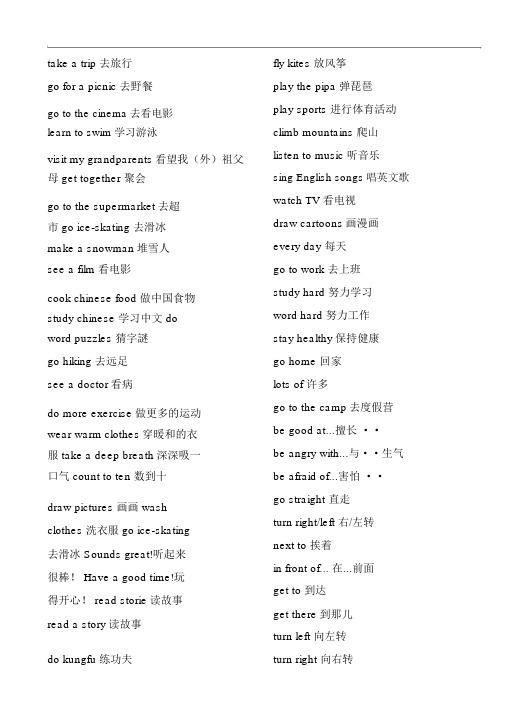
take a trip 去旅行go for a picnic 去野餐go to the cinema去看电影learn to swim 学习游泳visit my grandparents看望我(外)祖父母 get together 聚会go to the supermarket去超市 go ice-skating 去滑冰make a snowman堆雪人see a film 看电影cook chinese food 做中国食物study chinese 学习中文 doword puzzles 猜字謎go hiking 去远足see a doctor看病do more exercise做更多的运动wear warm clothes穿暖和的衣服 take a deep breath深深吸一口气 count to ten 数到十draw pictures 画画 washclothes 洗衣服 go ice-skating去滑冰 Sounds great!听起来很棒! Have a good time!玩得开心! read storie读故事read a story读故事do kungfu 练功夫fly kites 放风筝play the pipa 弹琵琶play sports 进行体育活动climb mountains 爬山listen to music 听音乐sing English songs唱英文歌watch TV 看电视draw cartoons画漫画every day 每天go to work 去上班study hard 努力学习word hard 努力工作stay healthy保持健康go home 回家lots of 许多go to the camp去度假营be good at...擅长··be angry with...与··生气be afraid of...害怕··go straight 直走turn right/left 右/左转next to 挨着in front of... 在...前面get to 到达get there到那儿turn left 向左转turn right 向右转be far from 远离the day before yesterday前天slow down 慢下来see a film 看电影pay attention to注意read a book 看书traffic lights 交通信号灯read a book看书Slow down and stop at a yellow light read books看书stop and wait at a yellow light go boating去划船Go at a green light 绿灯停go fishing去钓鱼take the NO.57 bus乘 57 路公交车go camping去野营this weekend这周末go swimming 去游泳next week 下周ride a bike骑自行车this morning/afternoon ride a horse骑马/evening 今天上午 /下午 /晚上hurt my foot我的脚受伤next weekend下周末 look for寻找take pictures照相have to 必须basket篮;筐Longer and longer越来越长buy gifts买礼物lower and lower 越来越低eat fresh food吃新鲜的食物clean my room 打扫我的房间fall off从摔倒last weekend 上个周末look like 看起来像wash my clothes 洗我的衣服over the winter holiday 在寒假期间last Monday 上个星期一two years ado 两年前stay at home 待在家里two months ago 两个月前last night 昨晚last year 去年watch TV 看电视last month 上个月yesterday evening昨天晚上go cycling 骑自行车 ice-skate 滑冰drink tea 喝茶play badminton 打羽毛球yesterday昨天one day 某一天have a cold 感冒look up 查找小学赠送以下资料考试知识点技巧大全一、考试中途应饮葡萄糖水大脑是记忆的场所,脑中有数亿个神经细胞在不停地进行着繁重的活动,大脑细胞活动需要大量能量。
人教版(PEP)小学六年级暑假英语上册知识点归纳

人教版(PEP)小学六年级英语上册知识点归纳Unit 3 What are you going to do ?一、重点短语:this morning 今天上午 this afternoon 今天下午 thisevening 今天晚上next week 下周 tomorrow 明天 tonight 今晚 post card 明信片comic book漫画书 newspaper报纸二、重点句型:1.What are you going to do on the weekend?你周末打算做什么?2.I’m going to visit mygrandparents this weekend?这个周末我打算去看望我的外祖父母。
3.Where are you going this afternoon?你今天下午打算去哪里?4.I’m going to thebookstore.我打算去书店。
5.What are you going to buy?你打算去买什么?6.I’m going to buy a comicbook.我打算去买一本漫画书。
三、重点语法:1、What are you goingto do?你想做什么?询问他人在未来的打算。
be going to 后面要跟动词的原形。
注意be going to be 意思是 "打算成为什么,干什么职业。
"注意一下句子的区别,找出正确回答。
What are you going to do this afternoon?What are you going tobuy?What are you going to be?When? are you going?Where are you going?How areyou going?Who are you going with?2、this evening 和 tonight的区别:this evening指的是今天晚上睡觉以前的时间,一般指晚上十二点以前。
人教版英语六年级上册各单元总结
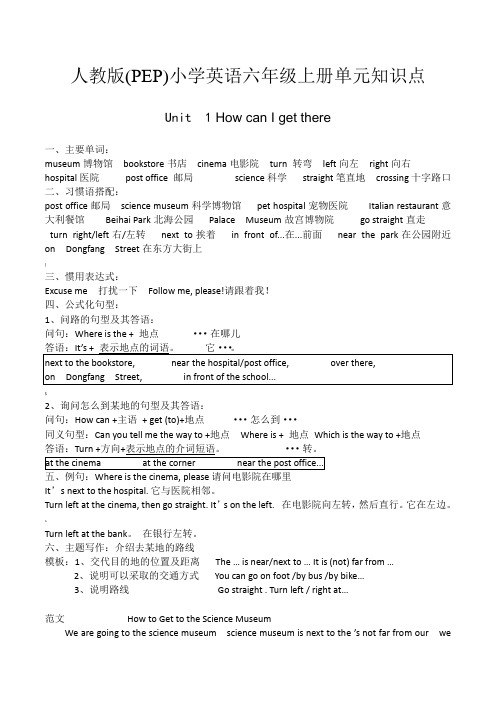
人教版(PEP)小学英语六年级上册单元知识点Unit1 How can I get there一、主要单词:museum博物馆bookstore书店cinema电影院turn 转弯left向左right向右hospital医院post office 邮局science科学straight笔直地crossing十字路口二、习惯语搭配:post office邮局science museum科学博物馆pet hospital宠物医院Italian restaurant意大利餐馆Beihai Park北海公园Palace Museum故宫博物院go straight直走turn right/left右/左转next to挨着in front of...在...前面near the park在公园附近on Dongfang Street在东方大街上}三、惯用表达式:Excuse me 打扰一下Follow me, please!请跟着我!四、公式化句型:1、问路的句型及其答语:问句:Where is the + 地点···在哪儿$2、询问怎么到某地的句型及其答语:问句:How can +主语+ get (to)+地点···怎么到···同义句型:Can you tell me the way to +地点Where is + 地点Which is the way to +地点五、例句:Where is the cinema, please 请问电影院在哪里It’s next to the hospital. 它与医院相邻。
Turn left at the cinema, then go straight. It’s on the left. 在电影院向左转,然后直行。
它在左边。
^Turn left at the bank。
新版PEP小学英语六年级上册1-6单元知识点总结

新版PEP 小学英语六年级上册1-6单元知识点总结Unit1 How can I get there?library 图书馆 north (北) post office 邮局 hospital 医院 turn left 左转 turn right 右转 places: cinema 电影院 (地点) bookstore 书店 (东) east west (西) science muse 科学博物馆 pet hospital 宠物医院 crossing 十字路口 school 学校 south(南) supermarket 超市shoe store 鞋店 go straight 直行一、问路1.Where is the cinema ; please? 请问电影院在哪儿?next to the hospital. 在医院的旁边。
in front of the school. 在学校的前面.behind the park 在公园的后面It’s near the zoo. 在动物园的附近.on the right/left of the bookstore. 在书店的左/右边.east of the bank. 在银行的东边.far from here. 离这儿很远.2. Excuse me ; is there a cinema near here 请问这附近有电影院吗?Yes ; there is. /No ;there isn ’t. 有./没有。
3. How can I get to the hospital? 我该怎样到达医院呢?Take the No.57…..…二、指引路1. You can take the No.312 bus. 你可乘坐312路公交车去那儿.2. Go straight for three minutes. 向前直走在分钟.3. Turn right/ left at the … 在… 地方向右/ 左转.4. Walk east/ west/ south/ north for … minutes. 朝东/ 西/南/北/ 走…分钟.三 Is it far from here? 离这儿远吗?Yes ; it is. / No ; it isn’t. 是的很远/ 不是很远。
人教版(PEP)小学英语六年级上册各单元知识点归纳(三年级起点)
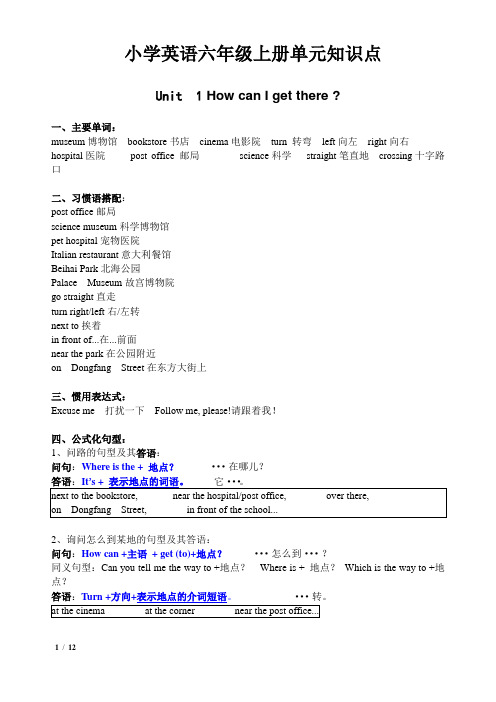
小学英语六年级上册单元知识点Unit1 How can I get there ?一、主要单词:museum博物馆bookstore书店cinema电影院turn 转弯left向左right向右hospital医院post office 邮局science科学straight笔直地crossing十字路口二、习惯语搭配:post office邮局science museum科学博物馆pet hospital宠物医院Italian restaurant意大利餐馆Beihai Park北海公园Palace Museum故宫博物院go straight直走turn right/left右/左转next to挨着in front of...在...前面near the park在公园附近on Dongfang Street在东方大街上三、惯用表达式:Excuse me 打扰一下Follow me, please!请跟着我!四、公式化句型:1、问路的句型及其答语:问句:Where is the + 地点?···在哪儿?2、询问怎么到某地的句型及其答语:问句:How can +主语+ get (to)+地点?···怎么到···?同义句型:Can you tell me the way to +地点?Where is + 地点?Which is the way to +地点?答语:Turn +方向+表示地点的介词短语。
···转。
五、例句:Where is the cinema, please? 请问电影院在哪里?It’s next to the hospital. 它与医院相邻。
Turn left at the cinema, then go straight. It’s on the left. 在电影院向左转,然后直行。
PEP小学英语六年级上下全册知识点总结
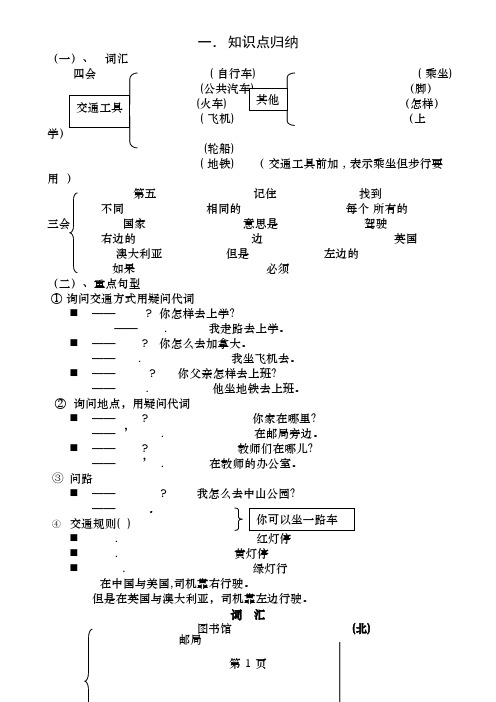
一. 知识点归纳(一)、 词汇乘坐) (脚)火车(怎样) 飞机(上轮船) ( 地铁) ( 交通工具前加 , 表示乘坐但步行要用 )第五 记住 找到不同 相同的 每个 所有的三会 国家 意思是 驾驶右边的 边 英国 澳大利亚 但是 左边的 如果 必须(二)、重点句型① 询问交通方式用疑问代词⏹ —— ? 你怎样去上学?—— . 我走路去上学。
⏹ —— ? 你怎么去加拿大。
—— . 我坐飞机去。
⏹ —— ? 你父亲怎样去上班?—— . 他坐地铁去上班。
② 询问地点,用疑问代词⏹ —— ? 你家在哪里?—— ’ . 在邮局旁边。
⏹ —— ? 教师们在哪儿?—— ’ . 在教师的办公室。
③ 问路⏹ —— ? 我怎么去中山公园?—— .④ 交通规则( )⏹ ⏹ . 黄灯停 ⏹ . 绿灯行在中国与美国,司机靠右行驶。
但是在英国与澳大利亚,司机靠左边行驶。
词 汇图书馆 (北) 邮局医院: 电影院(地点) 书店 (东) (西)科学博物馆银行学校(南)超市鞋店在哪里请与…相邻右边,正确的左边成直线地然后转弯对不起想要双分钟告诉乘坐远放学以后上车下车第十二聚会;晚会开始买句型一、问路. , ? 请问电影院在哪儿?. 在医院的旁边。
. 在学校的前面.在公园的后面’ . 在动物园的附近.. 在书店的左右边.. 在银行的东边.. 离这儿很远.. , 请问这附近有电影院吗?, . 有.. ? 我该怎样到达医院呢?二、指引路. . 你可乘坐路公交车去那儿.. …在…地方上车下车.. . 向前直走在分钟.. …在…地方向右左转.朝东西南北走…分钟.三 ? 离这儿远吗?一.知识点归纳(一)、词汇四会下周报纸今天上午漫画书今天下午杂志(时间 ) 今天晚上字典今夜明信片明天去旅游主题公园买一些水果宠物店(活动)去看电影(其他)水果摊参观长城鞋店阅读有关植物的杂志商店三会:忙碌的一起地需要其他二、重点句式与句型:本单元中出现的一个重点语法项目是一般将来时:表示将要发生的动作或状态,常与表示将来的时间连用。
(Unit 6)小学英语人教版PEP六年级上册知识汇总

Unit 6四会词(会听说读写)考查形式:听力或笔试补全单词题PA angry 生气的afraid 害怕的sad 伤心的worried 担心的happy 开心的PB see a doctor 看医生do more exercise 多做运动wear warm clothes 穿暖和的衣服take a deep breath 深呼吸count to ten 数到十wear 穿count 数数more 更多的deep 深的breath 呼吸三会词(会听说读)考查形式:笔试第一大题选择不同类(同类)一项mice 老鼠(mouse 的复数)chase 追逐(三单:chases)(ing 形式:chasing)be afraid of 对...害怕be angry with 对...生气bad 坏的hurt 伤害maybe 也许ill 生病What’s wrong?怎么了?should 应该feel 感到well 好;健康not well 不太好wrong 有毛病ant 蚂蚁sit 坐on the grass 在草坪上hear 听见worry 担心stuck in 陷入mud 泥everyone 每人pull (+人)out of (把某人)拉出来be nice to (+人)对(某人)友好重点句型考查形式:连词成句The mice are afraid of the cat.老鼠害怕猫。
The cat is angry with them.猫对他们感到愤怒。
Maybe our cat is chasing a mouse now!也许我们的猫正在抓老鼠呢!--What’s wrong?怎么了?--Your father is ill.你爸爸生病了。
He should see a doctor this morning.今天早晨他应该去看医生。
How does Dad feel now ?父亲现在感觉怎么样?Don’t be sad.别伤心。
人教版小学pep英语(三年级起点)六年级上册知识点归纳

Unit1 How can I get there? 我怎样到达这里?重点单词:where哪里how 怎样can能够near近的ask问tell 告诉far远的science科学 hospital 医院museum 博物馆postoffice 邮局library图书馆bookstore 书店usually通常 sometimes有时候 often 经常know知道 near旁边next to旁边(比near更近)crossing 十字路口turn left 向左转turn right 向右转 go straight直走in front of在…的前面behind在...的后面重点句子:1.How do you go to school? 你是怎样去上学的?2.where is the restaurant? 餐馆在哪里?ually I go to school on foot.我通常走路去上学。
4.Sometimes I go by bike.有时候我骑自行车去。
、5.问路之前,出于礼貌,我们要说“Excuse me.”与后面的句子要用标点符号隔开。
6.Look at the traffic lights, remember the trafficrules.看着交通灯,记住交通规则。
7.Stop at a red light.Wait at a yellow light.Go at agreen light.红灯停。
黄灯等一等。
绿灯行。
8.Red means stop, yellow means wait, green means go.红色的意思是停止,黄色的意思是等待,绿色的意思是通行。
9.How can I get to the park? 我该怎样到达公园呢?10.You can go by the No.15 bus.你可以坐15路公交车去。
重点知识:1.坐某种交通工具用by,例如:by bike, by train。
新版PEP小学英语六年级上册1-6单元知识点总结

一、问路1. Where is the cinema, please next to the hospital. in front of the school.beh ind the park n ear the zoo. on the right/left of the bookstore.在书店的左/ 右边. east of the bank. 在银行的 东边. i far from here.离这儿 很远.请问这附近有电影院吗 有./没有。
我该怎样到达医院呢 You can take the bus. Go straight for three minu tes. Turn right/ left at the Walk east/ west/ south/ n orth for 三 Is it far from here离这儿远吗Yes, it is. / No, it isn 是的很远t 不是很远。
Unit 2 Ways to go to schoolsubway 地(^)(交通工具前加by ,表示乘坐但步行要用on foot )(二)、重点句型 ①询问交通方式用疑问代词howplaces: (地点)六年级PEP 上册知识总结 Un itl How can I get therelibrary 图书馆 post office 邮局 hospital 医院 ci nema 电影院 bookstore 书店 scie nee mu 科学博物馆 pet hospital 宠物医院 school 学校 supermarket 超市 shoe store 鞋店 north 北) turn left 左转 turn right 右转 东)east cross in 十 souths^wes 西()字路口go straigh 直 行请问电影院在哪儿在医院的旁边。
在学校的前面. 在公园的后面 在动物园的附近.It ' s J 2. Excuse me, is there a cin ema n earhereY es, there is. /No,there isnt.3. How can I get to the hospitalTake the …..…二、指引路 1. 2. 3. 4. 你可乘坐312路公交车去那儿. 向前直走在分钟. …在…地方向右/左转. 朝东•/ nSn 南e 北匕/走…分钟. 知识点归纳J 、 词汇 四会交通工具 traffic tools<bike (自行车)bu 公共汽车)tra 火车) pla ne 飞叽) shi 轮船)taxi 出租车b 乘坐)slow down 慢下来foo (脚)stop 停下来 how 怎样) go to schoo 止 学) sled 雪橇ferry 轮渡—— How do you go/come to school你怎样去/来上学----- I go/come to school on foot . 我走路去/ 来上学。
人教版(PEP)小学英语六年级上册各单元知识点归纳(三年级起点)
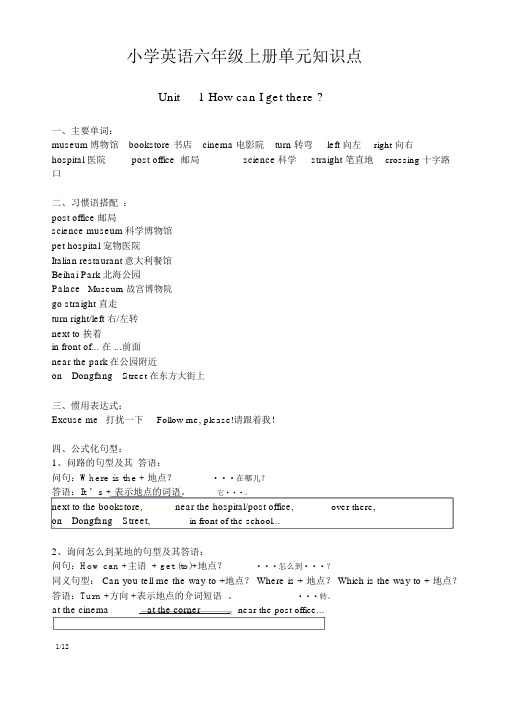
小学英语六年级上册单元知识点Unit 1 How can I get there ?一、主要单词:museum博物馆bookstore 书店cinema 电影院turn 转弯left 向左right 向右hospital 医院post office 邮局science科学straight 笔直地crossing 十字路口二、习惯语搭配:post office 邮局science museum科学博物馆pet hospital 宠物医院Italian restaurant意大利餐馆Beihai Park 北海公园Palace Museum 故宫博物院go straight 直走turn right/left 右/左转next to 挨着in front of... 在 ...前面near the park在公园附近on Dongfang Street 在东方大街上三、惯用表达式:Excuse me打扰一下Follow me, please!请跟着我!四、公式化句型:1、问路的句型及其答语:问句:Where is the + 地点?···在哪儿?答语:It ’s + 表示地点的词语。
它···。
next to the bookstore,near the hospital/post office,over there,on Dongfang Street,in front of the school...2、询问怎么到某地的句型及其答语:问句:How can +主语 + get (to)+地点?···怎么到···?同义句型: Can you tell me the way to +地点? Where is + 地点? Which is the way to + 地点?答语:Turn +方向 +表示地点的介词短语。
- 1、下载文档前请自行甄别文档内容的完整性,平台不提供额外的编辑、内容补充、找答案等附加服务。
- 2、"仅部分预览"的文档,不可在线预览部分如存在完整性等问题,可反馈申请退款(可完整预览的文档不适用该条件!)。
- 3、如文档侵犯您的权益,请联系客服反馈,我们会尽快为您处理(人工客服工作时间:9:00-18:30)。
1 Unit 1 How Do You Go There ? 一. 知识点归纳 (一)、 词汇 四会 bike ( 自行车) by ( 乘坐) bus (公共汽车) foot (脚) train (火车) how (怎样) plane ( 飞机) go to school (上学) ship (轮船) subway ( 地铁) ( 交通工具前加by , 表示乘坐但步行要用on foot ) fifth 第五 remember记住 find 找到 difference不同 same相同的 every 每个 所有的 三会 country 国家 mean意思是 drive驾驶 right右边的 side 边 England 英国 Australia 澳大利亚 however 但是 left左边的 if 如果 must 必须 (二)、重点句型 主要句子:
How do you go to school?你怎么去上学? Usually I go to school on foot. Sometimes I go by bus. 通常我步行去上学。有时候骑自行车去。 How can I get to Zhongshan Park ?我怎么到达中山公园? You can go by the No. 15 bus.你可以坐15路公共汽车去。 Stop at a red light . 红灯停 Wait at a yellow light . 黄灯停 Go at a green light . 绿灯行 In China and the US , drivers drive on the right side of the road . 在中国和美国,司机靠右行驶。 In England and Australia, however, drivers drive on the left side of the road. 但是在英国和澳大利亚,司机靠左边行驶。
Unit 2 Where is the science museum? 词 汇 library 图书馆 north (北) post office 邮局 hospital 医院 places: cinema 电影院 (地点) bookstore 书店 (东) east west (西) science musem科学博物馆 bank 银行 school 学校 south(南) supermarket 超市 shoe store 鞋店
交通工具 traffic tools
其他
四会单词 2
四会单词: where 在哪里 please请 next to 与…相邻right 右边,正确的 left 左边 straight成直线地 then 然后 turn转弯
认读单词:excuse me 对不起 want 想要 a pair of 双 minute分钟 tell 告诉 take乘坐 far 远 after school 放学以后 get off下车 get on上车 twelfth 第十二 party聚会;晚会 start 开始 buy买
句 型 一、问路 1.Where is the cinema, please? 请问电影院在哪儿? next to the hospital. 在医院的旁边。 in front of the school. 在学校的前面. behind the park 在公园的后面 near the zoo. 在动物园的附近. on the right/left of the bookstore. 在书店的左/右边. east of the bank. 在银行的东边. far from here. 离这儿很远.
2. Excuse me, is there a cinema near here ? 请问这附近有电影院吗? Yes, there is. 有. 3. How can I get to the hospital? 我该怎样到达医院呢? You can go … 二、指引路 1. You can go by the No.312 bus. 你可乘坐312路公交车去那儿. 2. Get on / off at the … 在…地方上车/ 下车. 3. Walk straight for three minutes. 向前直走在分钟. 4. Turn right/ left at the … 在… 地方向右/ 左转. 5. Walk east/ west/ south/ north for … minutes. 朝东/ 西/南/北/ 走…分钟. 三 Is it far from here? 离这儿远吗? Yes, it is. / No, it isn’t.
Unit 3 What are you going to do? 一. 知识点归纳 (一)、 词汇 四会 next week 下周 newspaper 报纸 this morning 今天上午 comic book 漫画书 Time this afternoon 今天下午 magazine 杂志 (时间 ) this evening 今天晚上 dictionary 字典 tonight 今夜 post card 明信片 tomorrow 明天
take a trip 去旅游 theme park 主题公园 activities buy some fruit 买一些水果 others pet shop 宠物店 (活动) go to the cinema 去看电影 (其他) fruit stand 水果摊 visit the Great Wall 参观长城 shoe store 鞋店 read a magazine about plants 阅读有关植物的杂志 shop 商店
It’s 3
三会: busy 忙碌的 together 一起地 need 需要 else 其他
二、 重点句式和句型: 三、 重点句型: 本单元中出现的一个重点语法项目是一般将来时:表示将要发生的动作或状态 ,常和表示将来的时间连用。 1-----What are you going to do on the weekend? -----I’m going to visit my grandparents this weekend?
2.-----Where are you going this afternoon? -------I’m going to the bookstore. 3.----- What are you going to buy?你打算去买什么? ------I’m going to buy a comic book。我打算去买一本漫画书。 4.-----When are you going to the bookstore? This afternoon. 4. How are you going to the bookstore? I’m not going to the bookstore by bus 5. I’m going to have a busy weekend! 我将要度过一个繁忙的周末。 6. That will be fun! 那将会很有意思。 7. What else? 还要什么? 8. ----What are you going to do in the future? 你将来想干什么? -----I’m going to be a science teacher one day. 我想将来有一天当科学老师。 ----- W hat about you ? 你呢? -----I want to be a computer expert in the future. 我想当个电脑专家。
Unit 4 I have a pen pal 知识点归纳: 一. 本单元主要是谈论某人的兴趣爱好。 二. 语法是动词的-ing形式和动词的第三人称单数形式。 三. 词汇: ride a bike (riding a bike) 骑自行车 dive (diving ) 跳水 hobby play the violin (playing the volin) 拉小提琴 (爱好) make kites (making kites ) 制作风筝 collect stamps (collecting stamps) 集邮 live (lives) 居住,住 teach (teaches) 教 go (goes) 去 watch (watches) 看 read (reads) 读 do (does)
其他:show(展览) pen pal(笔友) dear (亲爱的) twin(双胞胎之一) look (看上去) fun (快乐,乐趣) with(同…)
第三人称单数 4
四.句型: 四会句型: —What’s your hobby? 你的爱好是什么? --I like collecting stamps. 我喜欢集邮。 He likes collecting stamps, too. 他也喜欢集邮。 .—Does she teach English? 她是教英语的吗? --No, she doesn’t. /Yes, she does. 不,她不是。/是,她是的。 知识点:1. 询问某人的爱好: ----What’s your hobby? 你的爱好是什么? ----I like collecting stamps. 我喜欢集邮 2. 表示征求别人意见: (1)----what about you ? 你呢? ----Me too. 我也是。 (2)--- Let’s go together. 让我们一起去吧。 (3)---- Can he go with us? ----- Sure! 请记住: 1. 当询问一个人的爱好时,like(喜欢)后面动词要加—ing形式. 例如: --What’s your hobby? --I like swimming. /He likes riding a bike.
(my我的 your你的;你们的his他的 her她的our我们的their他们的/她们的/它们的) 2. 第三人称单数后面的动词要加s或es 1. 一般情况加s, 如: read—reads; live—lives; play—plays; sing—sings 2. 动词末尾以s,x,ch,sh或部分以o结尾的加es。 (记住课 本中出现的这几个:watches, teaches, goes, does, washes) 3. 辅音字母+y结尾的把y变i再加es, 如: fly—flies; study —studies 4. 特殊情况:have—has 5. 第三人称单数包括:he; she; it; my father/friend;Amy/Hangzhou等一个人名或地名。 例如: He likes drawing pictures. She works in a car company. It comes from the clouds. My father goes to work on foot. Li Lei often plays computer games after lunch. 6. 一般疑问句记住: 前面do加了es, 后面动词就不变化了。 例如:Does she teach English? Does your pen pal live in Hangzhou?
